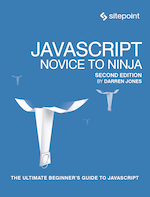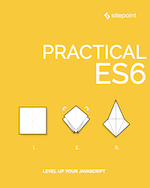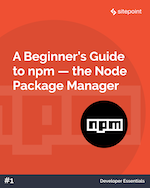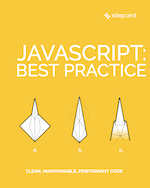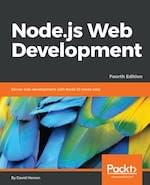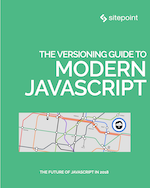
Are you daunted by the complexity of the JavaScript ecosystem? Are you still writing ES5, but looking for an opportunity to embrace modern standards? Or, are you confused by the explosion of frameworks and build tools, and unsure what to learn first? Fear not, here are my handpicked selection of books from SitePoint Premium, intended to help you well on your way to mastering modern JavaScript.
JavaScript: Novice to Ninja, Second Edition
I've placed this book at the top of my list, as it has something for almost everybody. It starts by covering the fundamentals (and thus serves well as a desk reference), then moves on to tackle more advanced topics, such as testing and functional programming.
The second edition has been updated to cover ECMAScript 6 and does a great job of introducing you to its more common features. You also get to put your newly acquired knowledge into practice at the end of each chapter, as you build out a quiz app, adding features as you move through the book. I really like this project-based approach to learning and think it is one of the better ways to advance your programming skills.
For those who just want to dip, I'd recommend reading the Modern JavaScript Development chapter. This will bring you up-to-date with many of the recent developments, such as working with modules, and the hows and the whys of transpiling your code.
Practical ES6
This anthology picks up where Novice to Ninja left off and allows you to dive deeper into many of the newer additions to the JavaScript language. It covers much of the basic syntax (e.g. const, let, arrow functions, etc...), and offers a great way to get up to speed in a particular area.
There are also more in-depth articles on topics such as ES6 classes and ES6 modules, as well as a look at what came down the pipeline in ES2017 and ES2018. And if you're starting to get confused about what all these version numbers mean, we've got you covered. The anthology packs a chapter on JavaScript versioning and the process of deciding what gets added to the language.
A Beginner's Guide to npm - the Node Package Manager
npm is a package manager for JavaScript, similar to PHP's composer, or Perl's CPAN. It allows you to search an online database of packages (a.k.a. the registry) and install them on your machine. The npm registry is vast — containing over 600,000 packages — and I think it is fair to say that it has revolutionized the way JavaScript developers collaborate with each other.
This short book from our Developer Essentials series has made the list because npm is something you cannot ignore if you are serious about writing JavaScript in 2019. The guide walks you through getting npm installed and configured (which can sometimes be a tad tricky) and using it effectively in your day-to-day work. If you're going to learn just one JavaScript tool in 2019, make it npm. You'll encounter it in tutorials everywhere and it is the standard delivery mechanism for almost any modern JavaScript library out there.
JavaScript: Best Practice
Now that we've had a look at the basics, it's time to kick it up a notch with some JavaScript best practices. This anthology is full of tips and tricks to help you write modern JavaScript that is performant, maintainable, and reusable. It's hard to pick favorites from so many great titles, but there are two articles that stand out.
The Anatomy of a Modern JavaScript Application takes a good look at how to build a JavaScript application in 2019. It covers everything from application architecture to deployment and will help you to order many of the concepts and buzzwords you may have heard floating about.
Flow Control in Modern JavaScript introduces you to a variety of strategies for dealing with asynchronous JavaScript in a modern code base. It looks at one of my favorite additions to the language — async await — and dispels the myth that writing a JavaScript web app will automatically land you in callback hell.
Node.js Web Development, Fourth Edition
No journey through modern JavaScript would be complete without a look at how to run it on the server. And this book gives you an excellent starting point, bringing you straight to the heart of developing web applications with Node.js.
As you follow along you'll build and iterate on a note taking app. This will form the basis for learning all about real-time applications, data storage, user authentication, deployment with Docker and much more. And even if server-side development isn't your thing, I'd still recommend reading the first couple of chapters. These will give you a good idea where Node fits in to today's JavaScript landscape.
The Versioning Guide to Modern JavaScript
To finish we have The Versioning Guide to Modern JavaScript, which is really a large collection of links taken from the much-missed Versioning newsletter. I've included this, as there's so much going on in the world of modern JavaScript development, that I've barely been able to scratch the surface here. I'm confident that this guide will offer you a wealth of ideas and inspiration on what to dig into next.
And that's a wrap. I hope this curated list goes some way to helping you navigate the choppy waters of modern JavaScript development.
The post Master Modern JavaScript with This Curated Reading List appeared first on SitePoint.
by James Hibbard via SitePoint
